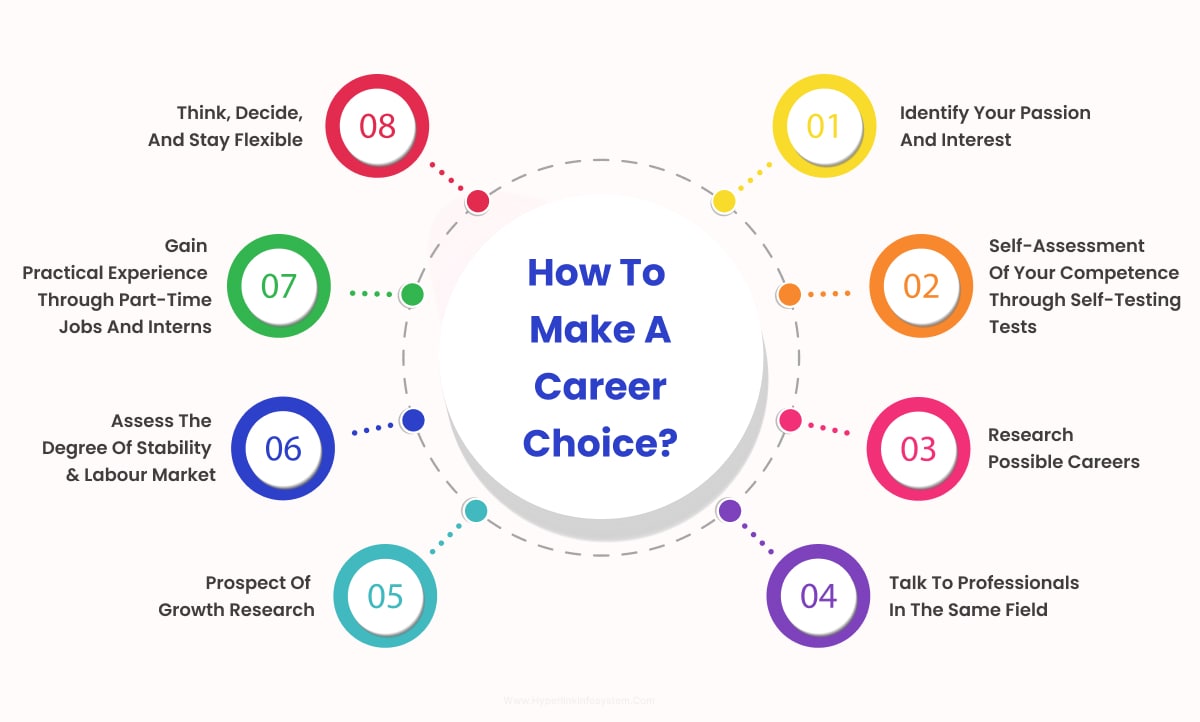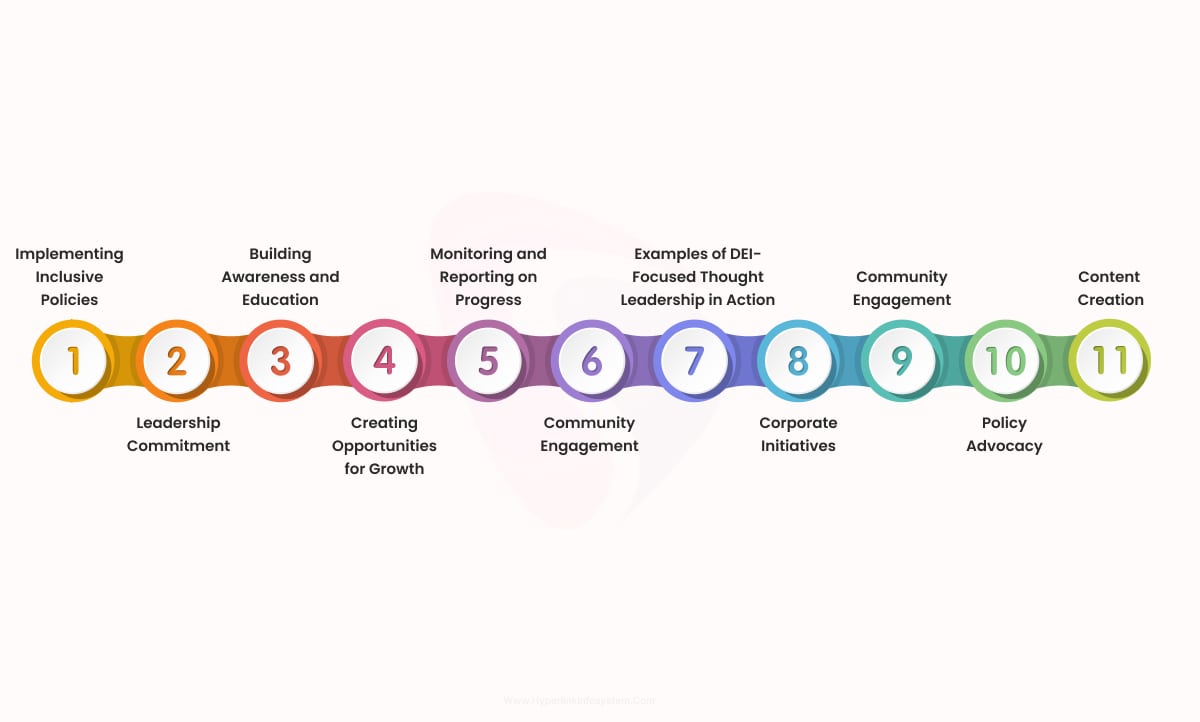
One of the most important decisions made by the human race is in choosing what profession it wants. This decision determines not only what we will end up doing at work but also how we are going to live our lives, as well as how happy we would be for that kind of life, and even our health. Yet, the sheer volume of options makes it tough to settle for the right one. Choosing a career involves some of the very correct considerations, from pursuing your passions to understanding your values and strengths. This article will take you through the necessary steps you need to take, questions to ask, and tips to help you select a career suitable for your short-term goals and long-term goals, interests, and special talents. This article may help simplify it for you so that it doesn't turn out to be overwhelming, either if you're just starting your career journey or want to change careers.
How to Make a Career Choice?

To select your career, you go about it in a series of steps. It will at least give you an idea of what you want to do once you follow these instructions.
Finding a professional path that fits with your values, interests, and talents is more important than simply selecting a job. The next step towards helping you identify a career aligned with your interests is this step-by-step guide:
1. Identify Your Passion and Interest
Begin by listing what you really like to do. If you learn how to choose a career based on your interests, then you are sorted. Hobbies, interests, or fields you enjoy learning more about maybe signposts. You are more likely to find inspiration and fulfillment in work if it has a passion theme. Write down these interests and brainstorm how they can be used to develop a career.
2. Self-assessment of Your Competence through Self-testing Tests
Take note of your strengths. What skills have you acquired through formal education, hobbies, or part-time jobs? Are you a writing whiz, a problem solver, or a skilled manual worker? You may be able to find a career that you like and do well at by assessing your strengths.
3. Research Possible Careers
So, start exploring a few career options after you become better equipped with your values, passions, and skills. Research fields of interest to you, job types, salary ranges, short-tems and long-term goals, and education or training requirements. The job listings, career websites, and online resources will give you a very good idea about what is out there.
4. Talk to Professionals In the Same Field
Talking to people working in the same profession is perhaps one of the best ways to really understand that profession. Explore career options on your list by reaching out to professionals. You can visit any networking events or career fairs or connect with professionals on any website, such as LinkedIn. You would be able to better prepare yourself for what to expect by finding out about their daily activities, problems, and professional development.
5. Prospect of Growth Research
Selecting a vocation that allows for professional and financial advancement is a smart move. Consider positions that will help you grow in your career and acquire new abilities. You can stay engaged and discover new chances with a profession that offers room for advancement.
6. Assess the Degree of Stability and Labour Market
While others are booming, a few sectors have a relatively stable market. Research the job market in your chosen profession. For instance, most of the job openings can usually be found in these industry sectors: healthcare, technology, and renewable energy. You could feel relatively safe in your employment and profession with one of these popular career choices.
7. Gain Practical Experience through Part-Time Jobs and Interns
Before you decide on a career, it is always better to gain first-hand experience. Volunteering, part-time work, and internships can give you an idea about the kind of work and the atmosphere at the workplace. It can also improve your resume and help in networking. You can search jobs on platforms such as LinkedIn, Naukri.com, etc.
8. Think, Decide, and Stay Flexible
Take some time now to reflect on what you have learned thus far. Think about how each choice supports your values, interests, strengths, and long-term goals. Then choose the career that satisfies the goals you have set both in your personal and professional lives.
That is why you can have a first preference that does not necessarily have to be your last. Most people do change careers at least once in their lifetime. As you grow, learn, and become interested in other activities, then it is perfectly fine to have an open mind about trying new things.
A person has to exercise an investigation process and introspection to finally get a vocation. He or she may select the choice of course he or she wants after having an awareness of his/her values, interests, and strengths while investigating several choices for the future course. Remember, it’s okay if it takes time, and it’s always possible to make adjustments along the way.
Top Emerging Careers Options to Choose

Changes in society globally and advances in technology open new and interesting professional pathways. Below is a list of some of the most interesting professions currently available, most of which enjoy excellent career possibilities and skills applicable to the future:
1. Analytics and Data Science
Data provides insight into decision-making in any industry. Data scientists and analysts decode complex data to support businesses in making prudence-driven decisions. Among some of the most sought-after professions in the industry are data scientist, data analyst, and machine learning engineer, among others.
2. Machine Learning and Artificial Intelligence
AI and machine learning professionals are concerned with designing algorithms and systems to enable computers to perform tasks heretofore thought to be exclusive to human intelligence. As the field spans industries—from healthcare to finance and beyond, to the retail world, the AI career spectrum is growing fast. Some roles include AI developer, machine learning, and robot engineering.
3. Cybersecurity
As cyber threats increase, the field of cybersecurity is more imperative. Experts in this field safeguard the organization from cyber-attacks and illegal access to the organization's data and digital assets. Among other professions with high demand and stability, one counts information security officers, ethical hackers, and cybersecurity analysts.
4. Content Production and Digital Marketing
Careers in digital marketing are flourishing as businesses promote themselves more and more online. While content creators produce interesting content for websites and social media, digital marketers design, oversee and improve online campaigns. Among the positions are content strategist, SEO specialist, and social media manager.
5. Renewable Energy Technician
This is because the world needs sustainable energy, hence the rising number of renewable energy careers, such as solar and wind energy careers. Among the careers include working with environmental engineers, wind turbine technicians, and solar panel installers. It is a career for those who would want to have a huge impact on the environment.
6. Medical Experts
Healthcare occupations are definitely in high demand. More specifically, a strong demand lies in occupations centered on specialized nursing, mental health, and elder care. Given that populations are aging and that demand for healthcare services is increasing, career possibilities for occupational therapists, nurse practitioners, and physician assistants are expanding significantly.
7. Blockchain Developer
This basic technology of cryptocurrencies, blockchain, is applied in some areas such as healthcare, logistics, and banking. Blockchain engineers develop decentralized applications and secure digital transactions. The profession is developing very fast, with strong demand and expansion potential.
8. Biomedical Engineering and Biotechnology
Biotechnology and biomedical engineering careers help bring about technologies for purposes that can be either environmental or medicinal. Biomedical engineers, genetic counsellors, and biotechnologists are only some of the jobs increasing in demand as genetics, biomedicine, and medicines advance.
9. Mental Health Professionals
The mental health career industry is changing because of increased awareness of these conditions. A social worker, psychologist, and mental health therapist assist others to cope with mental health issues. These career positions provide promising employment and increasing career scope with an increased need for mental health services.
10. Emergence of Augmented and Virtual Reality
Virtual and augmented reality are the technologies revolutionizing training, education, and entertainment. The developers of virtual reality and augmented reality create great immersive experiences for industries that play games, perform medical practices, and offer educational studies. Technical experience with the ability to code, 3D modeling, and creativity are required for the job in this industry.
Today's jobs market is changing day by day, with a new career opportunity opening up in various sectors. You would then find suitable career possibility either in line with your interests and long-term goals as well as expectations from the future by exploring the newly emerging fields. Whether you are entering a new profession or considering a career shift, emerging careers open your doors to all the exciting new ways of learning, innovating, and growing.
Common Mistakes While Choosing a Career
- Assuming Your Career is Linear.
- Basing Your Decision Entirely on Passion
- Choosing a Career for Money
- Following the Crowd
- Lack of Qualifications
- Ignoring Long-term Demand
- Ignoring Trends
- Lack of Proper Knowledge and Qualifications
Tips for Making the Right Career Choice
- Keep Exploring: Keep learning new things and skills to discover hidden passions.
- Set Achievable Objectives: To keep you going, divide your career journey into easily achievable parts.
- Find Mentorship: Get hold of experienced people who can provide you with wise guidance.
- Gain Practical Exposure: Freelancing or any internship would allow you to gain practical exposure and increase your self-confidence.
Conclusion
Choosing a career is an extremely subjective personal decision that requires patience, reflection, and investment. You may indeed find a fulfilling and valuable path by being attentive to your values, interests, and strengths while remaining open to further opportunities for growth. Remember that it's your job, not a destination; therefore, it is perfect to take the time and orient yourself as you go.
FAQs
Q- How to choose career?
Determine your values, interests, and talents, and then seek types of work opportunities that closely align with those. If one feels uncertain about his direction, do research, meet with a mentor or counselor, and take part in internships to flesh out things.
Q- Why can't I decide on a career?
Even though there are countless options out there in the new workforce, sometimes not knowing one's abilities or unsureness of what one wants to do causes indecisiveness when considering a career. To start to receive better guidance, use career coaching and self-reflection tools.
Q- Which is the best platform to find a job?
Indeed, Glassdoor and LinkedIn are the most popular employment search websites in terms of diverse job listings and networking opportunities for various industries.
Q- Which is best, LinkedIn or Naukri?
While Naukri specializes in the Indian job market, LinkedIn is one of the best platforms to make a global network for international job opportunities. Choose based on your requirements for networking and work location.



















